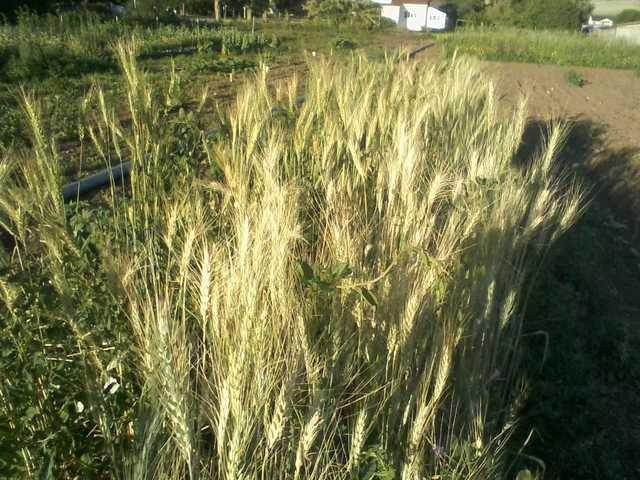

 3
3




Works at a residential alternative high school in the Himalayas SECMOL.org . "Back home" is Cape Cod, E Coast USA.
 2
2




 1
1




Alex Riddles wrote:I think you have made a math error that is effecting your logic.











Trying to achieve self-reliance on a tiny suburban plot: http://gardenofgaladriel.blogspot.com




Trying to achieve self-reliance on a tiny suburban plot: http://gardenofgaladriel.blogspot.com
 2
2




A human being should be able to change a diaper, plan an invasion, butcher a hog, conn a ship, design a building, write a sonnet, balance accounts, build a wall, set a bone, comfort the dying, take orders, give orders, cooperate, act alone, solve equations, analyze a new problem, pitch manure, program a computer, cook a tasty meal, fight efficiently, die gallantly. Specialization is for insects.
-Robert A. Heinlein
 3
3





 8
8




Galadriel Freden wrote:If we accept it is a famine food, that is it costs more calories than it provides, it simply couldn't be the bulk of calories consumed, or our ancestors would have all starved to death


 2
2




Hans Albert Quistorff, LMT projects on permies Hans Massage Qberry Farm magnet therapy gmail hquistorff





"Never doubt that a small group of thoughtful, committed citizens can change the world; indeed, it's the only thing that ever has."-Margaret Mead "The only thing worse than being blind, is having sight but no vision."-Helen Keller




Living in Anjou , France,
For the many not for the few
http://www.permies.com/t/80/31583/projects/Permie-Pennies-France#330873




The results showed clear differences between my starting sample and after three days of my forager diet. The good news was my gut microbal diversity increased a stunning 20%, including some totally novel African microbes, such as those of the phylum Synergistetes.
The bad news was, after a few days, my gut microbes had virtually returned to where they were before the trip. But we had learnt something important. However good your diet and gut health, it is not nearly as good as our ancestors’. Everyone should make the effort to improve their gut health by re-wilding their diet and lifestyle. Being more adventurous in your normal cuisine plus reconnecting with nature and its associated microbial life, may be what we all need.




Living in Anjou , France,
For the many not for the few
http://www.permies.com/t/80/31583/projects/Permie-Pennies-France#330873
 3
3




A human being should be able to change a diaper, plan an invasion, butcher a hog, conn a ship, design a building, write a sonnet, balance accounts, build a wall, set a bone, comfort the dying, take orders, give orders, cooperate, act alone, solve equations, analyze a new problem, pitch manure, program a computer, cook a tasty meal, fight efficiently, die gallantly. Specialization is for insects.
-Robert A. Heinlein






 2
2




r ranson wrote:Maybe the question I'm looking for is simpler.
How far back do we have to go to find a diet that our bodies are adapted to?
We're all in agreement that the Modern Western diet isn't working.
Do we really have to go back 10,000 years to find a diet that our bodies thrive on?
Could it be less?
What if, our bodies actually thrived on the diet of our individual ancestors 200 years ago? That would give me a North Western European diet heavy in wheat, milk, pulses, cabbage, and beer. But according to the SCD, most of these are 'illegal' foods for good health.
"Also, just as you want men to do to you, do the same way to them" (Luke 6:31)
 2
2




 3
3





Best luck: satisfaction
Greatest curse, greed














The article claimed that the most common way a species is created is when related species interbreed. The hybrids are sometimes superior in their particular environment than either of the parent species and go on to become a species of their own. We are also moving species all over the world and creating new environments which provide evolutionary opportunities. (species is one of those very vague words whose meaning is almost impossible to pin down. I think it highly likely that if the somewhat arbitrary rules (like coloring, size and body type variations, used to differentiate related animals, were applied to humans, we would be seen as several species.
"Never doubt that a small group of thoughtful, committed citizens can change the world; indeed, it's the only thing that ever has."-Margaret Mead "The only thing worse than being blind, is having sight but no vision."-Helen Keller









Thekla McDaniels wrote:
For those with impoverished gut microbiome, there are fecal transplants, and big science is working on pills rather than utilizing the rectal route currently utilized. It seems gross in the extreme (to me) but I know it has saved lives, especially from C. difficile infections.
I don't think the bacteria are as clever as the fungi at devising NEW enzymes, and I don't think we have fungal partners in our guts. From here on out, we need to protect the diversity in our guts, and from my understanding we can best do that by consuming a diverse diet.
Therap Adv Gastroenterol. 2012 Mar; 5(2): 111–125. wrote:Several clinical trials and experimental studies strongly suggest a place for Saccharomyces boulardii as a biotherapeutic agent for the prevention and treatment of several gastrointestinal diseases. S. boulardii mediates responses resembling the protective effects of the normal healthy gut flora. The multiple mechanisms of action of S. boulardii and its properties may explain its efficacy and beneficial effects in acute and chronic gastrointestinal diseases that have been confirmed by clinical trials




Living in Anjou , France,
For the many not for the few
http://www.permies.com/t/80/31583/projects/Permie-Pennies-France#330873










"Also, just as you want men to do to you, do the same way to them" (Luke 6:31)
 2
2












A human being should be able to change a diaper, plan an invasion, butcher a hog, conn a ship, design a building, write a sonnet, balance accounts, build a wall, set a bone, comfort the dying, take orders, give orders, cooperate, act alone, solve equations, analyze a new problem, pitch manure, program a computer, cook a tasty meal, fight efficiently, die gallantly. Specialization is for insects.
-Robert A. Heinlein






 1
1
 2
2




r ranson wrote:
Why am I thinking about this? We have two people in the home with gut illnesses. We're having trouble absorbing the required nutrients through our food alone and are seeking a diet that will heal our gut. Challange is, the reasoning behind that diet needs to make sense to me. Saying that human digestion hasn't changed in 10,000 years contradicts what I know of evolution from other sources. So I'm curious if there is some mechanism there that makes humans exempt from natural forces, if my previous understanding of how this all works is wrong, or if something else is going on.
My Food Forest - Mile elevation. Zone 6a. Southern Idaho <--I moved in year two...unfinished...probably has cattle on it.
 2
2




Nicole Alderman wrote:
Thekla McDaniels wrote:
I don't think the bacteria are as clever as the fungi at devising NEW enzymes, and I don't think we have fungal partners in our guts. From here on out, we need to protect the diversity in our guts, and from my understanding we can best do that by consuming a diverse diet.
I'm perplexed...what do you mean by us not having fungal partners in our guts? My husband supplements with saccharomyces boulardii, which is a beneficial fungus that helps treat c dif, Crohn's and other gut problems. Does "fungal partner" mean something else? Here's quote from a study on s. boulardii (https://www.ncbi.nlm.nih.gov/pmc/articles/PMC3296087/):
Best luck: satisfaction
Greatest curse, greed















r ranson wrote: Another thought is that I agree with Joseph about wheat and other grains being easy to grow and harvest. It would be great to have a bunch of us from this thread grow our own grain this year and get some more first-hand experiences with it. I think that those who haven't grown it yet would be surprised how much harvest we can get from it with so little effort. It would be a great topic for a new thread.
“The most important decision we make is whether we believe we live in a friendly or hostile universe.”― Albert Einstein
 4
4




Joshua Parke wrote:It doesn't seem to matter the ethnicity or location oriented ancestral diet, once someone goes on a diet of fruit with herbs, they get better....from every ailment.
How permies.com works
What is a Mother Tree ?
 1
1




This is all just my opinion based on a flawed memory















While I definitely agree that our ability to articulate a given problem, puzzle it out as a group, and come up with solutions is, and has been, a great adaptive advantage, I have never seen or heard of any evidence to support that there was some great leap in language and brain building in our species 15,000 years ago. For my own part, I believe that complex communication was likely a huge determining factor on our success, and our subsequent branching away from other early Hominoidea, but I have seen nothing that would lead me to believe that this occurred so late in our collective history; it happened far more in the past than that. I'm not at all aware of any study of early anthropecene skulls which might show that such a leap in brain development took place. Perhaps I have not been looking in the right anthropological circles?A spiral of socio-linguistic and physiological evolution in human brains around 15,000yrs ago surrounded the adaptation of syntax and complex language.
"Never doubt that a small group of thoughtful, committed citizens can change the world; indeed, it's the only thing that ever has."-Margaret Mead "The only thing worse than being blind, is having sight but no vision."-Helen Keller






 1
1
 1
1




Burra Maluca wrote:
Joshua Parke wrote:It doesn't seem to matter the ethnicity or location oriented ancestral diet, once someone goes on a diet of fruit with herbs, they get better....from every ailment.
Here's a thread about member's experience where the only thing that seems to improve his heath is the direct opposite - a zero carb diet eating nothing from plants.
My Experience Eating Nothing From Plants, aka Zero Carb
My Food Forest - Mile elevation. Zone 6a. Southern Idaho <--I moved in year two...unfinished...probably has cattle on it.





Best luck: satisfaction
Greatest curse, greed









Thekla McDaniels wrote:
The author talks about a food subcategory called 'lectin',in the plural. I am at a local internet place to research. The book does not tell me clearly what lectins are, but it seems like they are plant origin proteins that mimic many important substances in our metabolic pathways.
“The most important decision we make is whether we believe we live in a friendly or hostile universe.”― Albert Einstein








